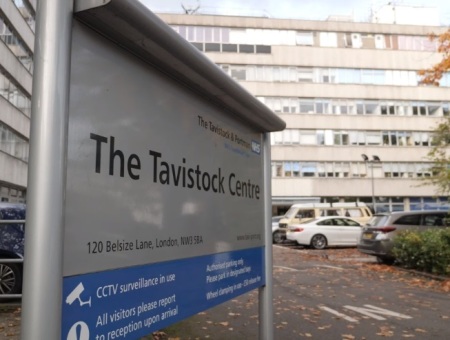NHS removes trans guidance claim that puberty blockers are ‘fully reversible’

The National Health Service in England has updated its policy on puberty blockers by removing the claim that the experimental drugs prescribed to transgender-identifying youth are "fully reversible." It now says it's unknown what the short-term and long-term effects will be on a person's bones, physical body and mental health.
The use of synthetic hormones to block the puberty processes of children experiencing gender dysphoria has faced increased scrutiny in recent years. And the changes made to the guidance come after a lawsuit was filed against the nation's sole gender clinic, the Tavistock and Portman National Health Service Trust in London, where an individual who underwent these experimental treatments says they caused irreparably harm to their body.
The former NHS guidelines previously stated that puberty blockers were reversible:
If your child has gender dysphoria and they've reached puberty, they could be treated with gonadotrophin-releasing hormone (GnRH) analogues. These are synthetic (man-made) hormones that suppress the hormones naturally produced by the body.
Some of the changes that take place during puberty are driven by hormones. For example, the hormone testosterone, which is produced by the testes in boys, helps stimulate penis growth.
GnRH analogues suppress the hormones produced by your child’s body. They also suppress puberty and can help delay potentially distressing physical changes caused by their body becoming even more like that of their biological sex, until they're old enough for the treatment options discussed below.
The effects of treatment with GnRH analogues are considered to be fully reversible, so treatment can usually be stopped at any time after a discussion between you, your child and your MDT.
The newly revised guidelines no longer contain the words "fully reversible" and now lists risk factors.
These hormone blockers (gonadotrophin-releasing hormone analogues) pause the physical changes of puberty, such as breast development or facial hair.
Little is known about the long-term side effects of hormone or puberty blockers in children with gender dysphoria.
Although the Gender Identity Development Service (GIDS) advises this is a physically reversible treatment if stopped, it is not known what the psychological effects may be.
It's also not known whether hormone blockers affect the development of the teenage brain or children's bones. Side effects may also include hot flushes, fatigue and mood alterations.
The updated NHS site also notes that the drugs are under an official review and that they yield irreversible effects including changes in breast development by taking estrogen, the deepening of the voice due to testosterone, and that long-term cross-sex hormone use can cause temporary or permanent sterility.
"Given that the NHS now says that hormone therapy for gender-variant children has unknown long-term effects on the physical and mental health of those children, why is the NHS still using such treatments on children? And what are the children and parents who were reassured by those earlier NHS words supposed to think now that the same service that issued those treatments is now admitting it doesn’t know what their long-term effects will be?" Spectator columnist James Kirkup inquired, adding that the former guidelines are now only viewable on the Wayback Machine, a digital archive founded by the San Francisco-based nonprofit group internet archive.
Earlier this year, the NHS announced it was revisiting its rules on permitting minors to take the experimental drugs without their parents' consent. Additionally, the NHS announced it was forming a task force of doctors to conduct a formal review of puberty blockers.
The moves came amid intensifying debate in the U.K. pertaining to transgender ideology, not only regarding pediatric medicalization of gender but proposed reforms to the Gender Recognition Act, which would allow individuals to self-identify as either sex without any medical documentation.
In late April, Liz Truss, the U.K.'s trade minister, announced that doctors would be banned from prescribing puberty blockers and cross-sex hormones to children who are younger than 18.
“Grown adults should be able to make decisions, to have the agency to live life as they see fit,” she said. “But before the age of 18, when people are still developing their decision-making capabilities, they should be protected from making decisions that are irreversible about their bodies that they could possibly regret in the future.”






















